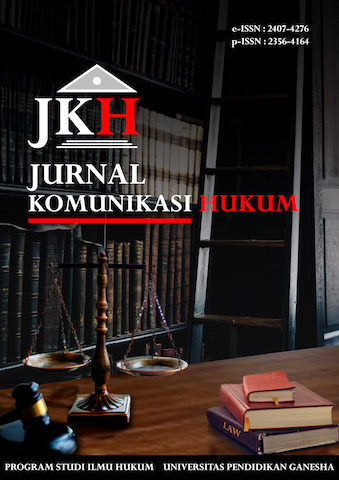EFEKTIFITAS PELAKSANAAN PIDANA MATI BANDAR NARKOBA
DOI:
https://doi.org/10.23887/jkh.v8i2.51641Abstract
The death penalty was among the most serious forms of crime in Indonesia. Not only in Indonesia, other countries far from Indonesia are also still debating the imposition of the death penalty. Drugs are dangerous substances that can damage the younger generation. Narcotics have become part of the perpetrators of drug dealers or dealers who are sentenced to death. The death penalty is considered as just since it can serve as a deterrence and can share horrors with someone who wants to commit a crime. On the other hand, the death penalty is a punishment that should not be applied because it deprives a person of the right to life. In dealing with this case, the author uses a qualitative approach. Qualitative research is understanding (understanding) social symptoms or phenomena by paying more attention to the complete picture of the phenomenon under study rather than breaking it down into related variables. According to the study's findings, the death sentence for drug-related offences should be abolished is still a criminal law enforced in Indonesia, as evidenced by the perpetrators of drug dealers and dealers of death penalty
Downloads
Published
How to Cite
Issue
Section
License
Authors who publish with this journal agree to the following terms:- Authors retain copyright and grant the journal right of first publication with the work simultaneously licensed under a Creative Commons Attribution License that allows others to share the work with an acknowledgement of the work's authorship and initial publication in this journal.
- Authors are able to enter into separate, additional contractual arrangements for the non-exclusive distribution of the journal's published version of the work (e.g., post it to an institutional repository or publish it in a book), with an acknowledgement of its initial publication in this journal.
- Authors are permitted and encouraged to post their work online (e.g., in institutional repositories or on their website) prior to and during the submission process, as it can lead to productive exchanges, as well as earlier and greater citation of published work (See The Effect of Open Access).
Authors who publish with this journal agree to the following terms:
- Authors retain copyright and grant the journal right of first publication, with the work [SPECIFY PERIOD OF TIME] after publication simultaneously licensed under aCreative Commons Attribution License that allows others to share the work with an acknowledgement of the work's authorship and initial publication in this journal.
- Authors are able to enter into separate, additional contractual arrangements for the non-exclusive distribution of the journal's published version of the work (e.g., post it to an institutional repository or publish it in a book), with an acknowledgement of its initial publication in this journal.
- Authors are permitted and encouraged to post their work online (e.g., in institutional repositories or on their website) prior to and during the submission process, as it can lead to productive exchanges, as well as earlier and greater citation of published work (See The Effect of Open Access).












